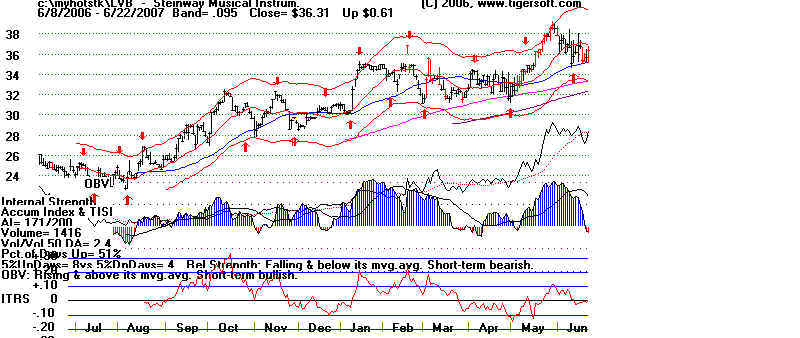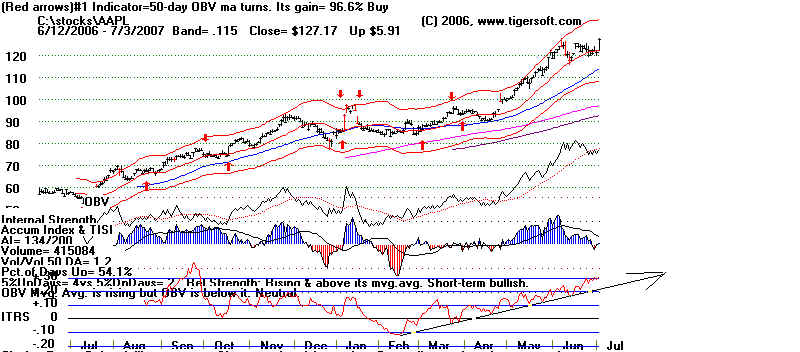| Daily Blog - Tiger Software |
Monday - June 25, 2007
Music, Musical Stocks and Music of the Stock Market.
Music endures and is a universal language. I am happy to share my musical tastes here.
I grew up listening to Hank WIlliams. It's his songs I sing in Karaoke here in San Diego.
Some have called him the Shakespeare of the Hills. I also especially like Johnny
Cash, Marty Robbins, Tom Jones and Slim Whitman. There are lots of excellent
Karaoke singers here in San Diego. Many have and do sing professionally.
(In fact, once, just once, someone asked me if I was a professional singer, after I did
my own version of "Don't Worry", a Marty Robbins song I do a la Slim Whitman.
I won't soon forget that moment in the sun.) You are welcome to visit My Music Page.
Apple (AAPL) and Steinway (LVB) come to mind as stocks you will want to consider
purchasing if you are looking to buy a musical stock. APPL trades very well being bought
and sold using a simple cross-overs of 5-day moving average. Our software shows that
someone using this simple system of buying and selling would have gained 94.4% for
the last year. The biggest intra-day loss would only have been 5.1%. There were
17 trades. The nine winning trades averaged gains of 9.6% each. The losing trades lost
only an average of 1.7% apiece. Monday's are the best day of the week for the stock,
being up 62.5% of the time. Friday's are the weakest being up only 37.0% of the time.
The stock opens much more regularly higher (63% of the time for the last year than it
closes above the opening (48% of the time. AAPL has nearly doubled from a year ago.
And it is up 54% of the time, day-to-day. All these things Tiger Software reveals about
any stock.
Steinway LVB) shows a lot of blue Tiger Accumulation, which makes it attractive.
Its aggression buying line (OBV) is, at least, as strong as the price movement. This
is bullish. And using Tiger's automatic buys and sells at the next days' openings,
without any short sales, would have gained a trader 67.4%. $10,000 invested this way
a year ago would have become $16,740, allowing $40 per trade for commissions.
public loves APPL and buys it at the opening. All nine trades would have been profitable.
The biggest paper loss would have been 10.6%.

, As you can see, the Tiger programs would have helped you make a lot of money here quite
easily. These tools are available with any stock or index. Get them today. Why wait? We have
thousands of happy customers.
Now something off the beat, as it were. Here is a site that creates music from the stock market' s own
fluctuations. They use the movements of prices to provide a melody.
collision detection: Music based on stock-market activity
Where is the Music Industry headed? Music: The New Stock Market . . .
A stock market for music. McBride's model says that "even a band selling 100000 units a year becomes profitable."
Is this what the future looks like? .
http://www.cultureby.com/trilogy/2007/01/a_stock_market_.html
And where do we go to sing. Check out: www.wookaraoke.com
Saturday evening - Sheraton's Shooters Lounge - La Jolla.
and Patrick Hiill's Show on Wednesday evening at Ramada Inn in Kearney Mesa.
APPLE Computer's Stock Breakout!
But....
Universal Puts Apple On Notice -- No iTunes Renewal
Universal
plans to sell music at will, meaning that it could withdraw its songs from Apple's online
store on short notice. The move is widely seen as an effort to obtain better contractual
terms from Apple
By Thomas
Claburn InformationWeek
e music market has prompted the world's largest record music company to fight for a greater share of the profits.
Vivendi SA's Universal Music Group told Apple last week that it that it would not be
renewing its annual contract to sell digital songs through Apple's ![]()
Instead, Universal plans to sell music at will, meaning that it could withdraw its songs from Apple's online store on short notice. The move is widely seen as an effort to obtain better contractual terms from Apple.
Music companies have long chafed at Apple's insistence on flat-rate pricing for music downloads. If Universal's discontent prompts concessions, expect iTunes pricing to become much more variable.
Universal's move is a risky one, however. Estimates published in the New York Times indicate that 15% of Universal's revenue for online music sales during the first quarter of the year came from Apple and other online stores. And Apple CEO Steve Jobs is not known for allowing Apple's partners to dictate how his company does business.
